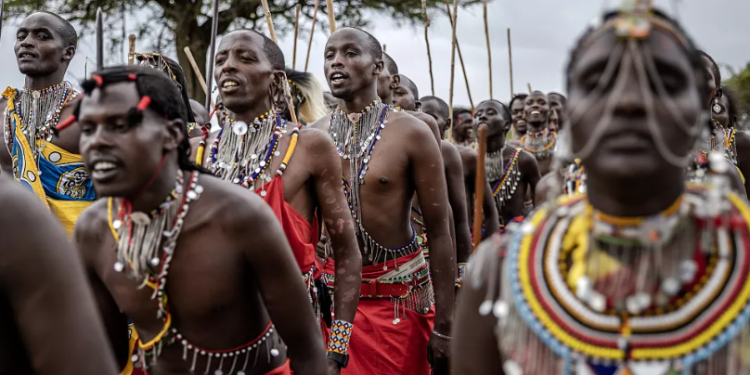With beaming smiles, their hair dyed a red ochre and adorned with a ceremonial headdress of ostrich feathers, the young Maasai men are busy taking selfies. They have just completed the first day of Eunoto, a traditional ritual marking the transition from young warrior to adulthood.
Read More: The Business of AI in Africa –Unlocking Opportunities for Innovation
Aged between 18 and 26, the young men came in their hundreds to the village of Nailare in southwestern Kenya, all from the same generation of “morans” (“warriors” in the Maasai language), a status they have held for a decade.
Many left their homes in the region to work or study in the cities of Kisii or Nairobi, or like Odupoy, further afield in the town of Machakos that lies more than seven hours away by road.
All wear red, the sacred colour of the Maasai — from their hair which is coated in a mixture of ochre and oil to their traditional plaid cloth shukas. This rite of passage brings together the families of the morans as well as local inhabitants and officials, in all several thousand people.
Read More: The Visionary Architects of Africa’s Tech Ecosystems
For five days, the Eunoto ceremony features traditional guttural chants, single-file dances on one leg, and the adumu — the famous Maasai jump. Cows are sacrificed and their blood drunk by the young men, whose hair is shaved from their heads by their mothers.
For centuries, Maasai men have gone through three rites of passage which have been inscribed since 2018 on the UNESCO list of intangible heritage in need of urgent safeguarding.
The morans no longer spend two years in an isolated village, called “emanyatta”, but meet there during school holidays to learn Maasai history and traditions, as well as the rules of life in society.
The killing of lions was to prove the bravery of the Maasai men, but has been illegal in Kenya for decades to protect the threatened animal. The decline of the lion population was also threatening tourism, a precious source of income in the southwestern region of Kenya which is notably home to the emblematic Maasai Mara wildlife park.
Read More: A New Norm ? Remote and Hybrid Work in the African Labor Market
In theory, young Maasai men can only marry after Eunoto, and their bride must have been circumcised. But female circumcision, or female genital mutilation (FGM) has been banned in Kenya since 2011 and is officially no longer practised or recommended.









